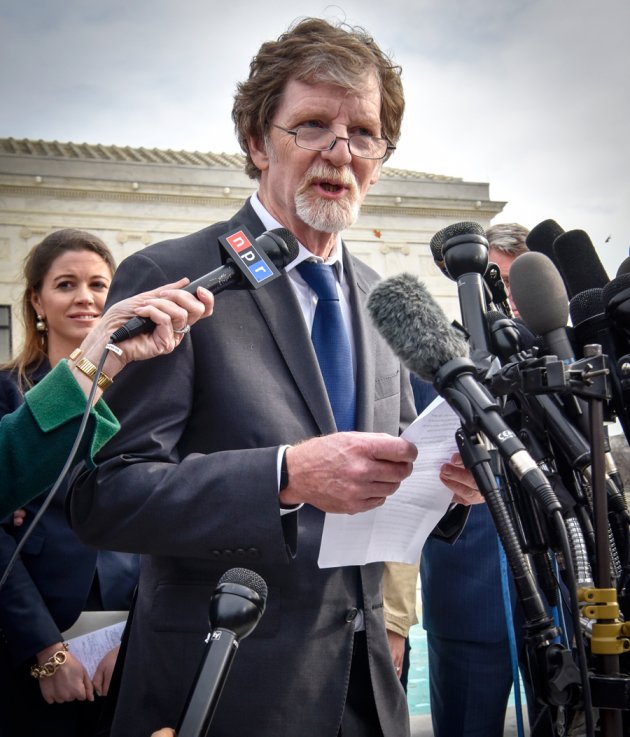Let Him Bake Cake?
December 21, 2017
In a case that will lay the precedent for First Amendment jurisprudence in the age of same-sex marriage, Jack Phillips, the proprietor of Colorado’s Masterpiece Cakeshop, has submitted his appeal to the U.S. Supreme Court and now awaits its heavy word. When David Mullins and Charlie Craig came to his shop for their wedding cake in June of 2012, Phillips, a Christian, informed them that his conscience would not allow him to provide a cake for their celebration. His conviction, he expressed to them, was that marriage was an institution reserved for male and female. After denying them a custom wedding cake, he offered to sell them any non-wedding product in the store, at which point “they both stormed out and left,” as Phillips recalls (de Vogue). Phillips elected to discontinue the wedding cake portion of his business, rather than obey Colorado’s relevant anti-discrimination statute, of which the courts deemed him a transgressor for his refusal.
The Colorado Civil Rights Commission, which argued in cooperation with a lawyer representing the couple itself, seeks to uphold these decisions of lower courts. “This case is about more than us, and it’s not about cakes,” the couple professes. “It’s about the right of gay people to receive equal service (de Vogue).”
On December 5th, the nine justices of the Supreme Court heard oral arguments on the matter, delivered for the petitioning Phillips by Kristen Waggoner of the Alliance Defending Freedom and U.S. Solicitor General Noel Francisco. Respondents David Mullins and Charlie Craig and the Colorado Civil Rights Commission were represented by Lawyers David Cole and Frederick Yarger, respectively.
The petitioner posits, essentially, that Colorado’s application of its public accommodations law, which compels him to “design and make a cake that violates his sincerely-held religious beliefs about same-sex marriage,” constitutes an infringement of the First Amendment’s provisions for rights of free speech and free exercise of religion. The Colorado Commission and the couple’s lawyer maintain that the Constitution does not grant “businesses open to the public the right to violate laws against discrimination in the commercial marketplace if the business happens to sell an artistic product (Oyez).”
During arguments on the 5th, counsellors for both sides of the murky question faced intense scrutiny from the Judges of the high court. Justice Sotomayor “asked Waggoner dubiously when the Supreme Court has ever ‘given protection to food?’,” suggesting that wedding cakes are not artistic “speech” as the petitioner asserts, but are merely edible items, unprotected by the Constitution’s first addendum (Howe). Justice Kagan questioned “whether a hairstylist or a make-up artist could cite his religious beliefs as the basis to refuse to provide services for a same-sex wedding,” to which Waggoner responded negatively. Justice Kagan seemed to think the counsel inconsistent for denying that other “artists” did not enjoy the great liberty that the petitioner supposedly did. Justice Kagan’s point, delivered indirectly, was that a baker could not distinctly be an artist while professionals with analogous work are certainly not artists, and therefore the baker was unprotected by the provision for free speech. On a point that the originalist Justice Gorsuch later expressed sensitivity to, Justice Stephen Breyer worried that a ruling for the petitioner would “undermine every civil rights law since year 2” (Howe).
Despite the objections of the court’s liberals, its conservative, originalist bloc proved steadfast in its judicial sympathy for the plea of the baker. Chief Justice John Roberts, in a very pointed inquiry, asked Mr. Yarger for Colorado “whether Catholic Legal Services, which provides legal services to all different faiths, could refuse to take on a case involving same-sex marriage on the ground that it violated the group’s religious beliefs.” Roberts reminded the attorney that under Colorado law, “the group would face an unpalatable set of choices: It could either stop providing any legal services at all or it could provide services that include same-sex marriage.” The Chief Justice’s apprehension, evidently, was that a ruling for the respondent would establish a principle that could nullify the free exercise of religion and illegalize the values central to religious life for many Americans by forcing them to behave in ways deeply contrary to their faith. Justice Gorsuch, the contribution to the Supreme Court of President Trump and the Senate, critiqued an element of lower court rulings on the case that demanded that Phillips provide new training to his staff regarding discrimination. Justice Gorsuch wondered why such a requirement wouldn’t be compelled speech “when it would require Phillips to tell his staff that his Christian beliefs are discriminatory? (Howe)” Compelled speech, of course is impermissible under the first amendment, which respects the rights of individuals to speak or not to speak without government sanction or obstruction.
Justice Anthony Kennedy, the maverick who penned the majority opinion in Obergefell V. Hodges, which interpreted the Constitution to allow same-sex marriages nationwide, is understood to be the swing mind in the Masterpiece Cakeshop case. According to SCOTUSblog, Justice Kennedy “initially seemed sympathetic to the same-sex couple but later expressed real concern that Colorado had not been sufficiently tolerant of the baker’s religious freedom.” While Justices Ginsburg, Kagan, Breyer, and Sotomayor are reliably expected to favor the Civil Rights Commission and the couple, Justices Roberts, Alito, Thomas, and Gorsuch will most likely rule in favor of the petitioner, Mr. Jack Phillips. Supreme Court Observers, frustrated, fall again upon Justice Anthony Kennedy as the arbiter of the American Constitution.
As in all cases granted certiorari by the Supreme Court, may the law, the Constitution, and justice, prevail.
